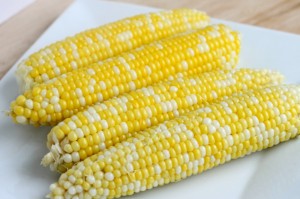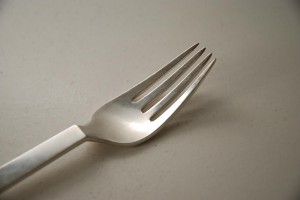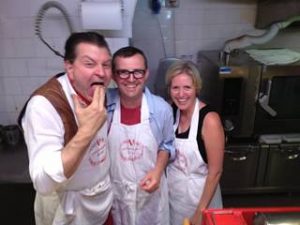 Our guidebook advises that Panzano is the loveliest hill town in Chianti, and we see no reason to disagree. Perched high above a valley dotted with olive groves and vineyards, Panzano is note-perfect, right down to the clusters of local men who sit in the town square drinking and gossiping all afternoon and rising only occasionally to ring in sales for tourists. Nevertheless, Panzano’s charm is just gravy on the main attraction: we’re here to see the butcher.
Our guidebook advises that Panzano is the loveliest hill town in Chianti, and we see no reason to disagree. Perched high above a valley dotted with olive groves and vineyards, Panzano is note-perfect, right down to the clusters of local men who sit in the town square drinking and gossiping all afternoon and rising only occasionally to ring in sales for tourists. Nevertheless, Panzano’s charm is just gravy on the main attraction: we’re here to see the butcher.
Much has been written about Dario Cecchini, arguably the most famous butcher in the world. A passionate advocate of forgotten and unappreciated cuts (think beef knees), Cecchini believes in using and enjoying the whole animal. Thanks to Bill Buford’s memoir Heat, which dedicated several chapters to the charismatic and volatile butcher, the Antica Macelleria Cecchini has become a required stop for North American foodies in Tuscany.
My husband, Rob, has planned our trip so that we can sample the five-course beef tasting menu at Officina della Bistecca, one of the three restaurants that Cecchini operates within steps of his shop. “The first course is beef tartare,” he tells me. “The second course is beef tartare that’s been passed near a flame.” Shortly before we leave for Italy, while trolling Cecchini’s website in anticipation, he realizes that we can do more that just eat in Panzano; we can work at the butcher shop for the day. “We get a souvenir apron!” Rob tells me.
All travel involves some compromise between spouses. I, for example, am making Rob rent a car and navigate roundabouts, an activity that nearly ended our marriage a decade ago. So I’m prepared to accumulate some goodwill at the butcher shop. I tell Rob to book it.
When we arrive, we meet Cecchini’s wife, Kim, an American who has lived in Italy for 25 years and Cecchini himself. Apparently, very few people sign up for Butcher for a Day, and they seem genuinely delighted to have us there. Kim gives us our schedule: a tour of the meat locker and the restaurant kitchen, followed by some hard labor making sausages in the shop.
At the meat locker, we are handed off to Liam, an apprentice butcher from Saskatoon, who has a tattoo on his neck of a heart wreathed in sausages: he’s obviously committed to the project. Liam is spending a year in Europe, refining his culinary techniques, and hopes to return home to Canada eventually and open a French restaurant in Montreal. For now, he takes us into the cold room where four men stand around a table, butchering huge slabs of meat with elegant efficiency. It’s fascinating, and oddly peaceful to watch. Liam introduces us, and adds that Orlando, the eldest in the group, has been a butcher for 60 years. “He taught Dario’s father,” Liam tells us.
Liam asks what brings us here, and I mention Buford’s book. Orlando (lionized in Heat as ‘the Maestro’) pauses for a moment, raises an eyebrow, and then continues gliding his knife over the filet that is emerging from the carcass on the table. I think I’ll keep the fact that I’m a writer to myself. The knives are remarkably sharp.
Next, we stop in at the kitchen to watch Simonetta making olive oil cakes. Actually, she is making batter for four cakes, each the size of a manhole cover. Anyone who has slaved over a cake only to watch it collapse knows that you deviate from a baking recipe at your peril. The ‘recipe’ for this cake, though, is entirely in Simonetta’s head, and begins with 90 eggs, a few macerated oranges and three kilos of sugar. At one point, she declares that the batter requires an additional kilo of sugar. When I ask how she knows, she shrugs and tells me she can ‘feel’ it as she whisks. Then she adds most of a cask of olive oil and something in the neighborhood of three-quarters of a bottle of Italian brandy, and sprinkles a few pine nuts on top: “Not too many; they’re expensive.” Later, I confide to Kim that I think Simonetta is a genius. Kim agrees, and tells me the recipe changes every time, but is always delicious.
Now we are deemed ready to make sausages. We put on our aprons. Miko, our supervisor, pours two huge bags of ground pork on a marble table along with a considerable amount of minced garlic and indicates that we should start kneading it. When this is done to his satisfaction, he leads us back to Dario for the preparation of the final ingredient. Dario pours salt and pepper into a bowl and begins working the mixture with one hand. After a minute or so, he holds it out for us to smell, and it is astonishing: the heat of the hand-mixing has added a hint of something smokier, more complex. Are there other ingredients? Cecchini nods. “Amore!” he says, “Passione!” We take the magic elixir, and return to our station to stuff and tie the sausages into links.
We lunch at the communal table upstairs, gorging ourselves on porchetta and Tuscan meatloaf, not to mention the spectacular olive oil cake. As we stop by the shop on our way out, Miko is behind the counter, selling our sausages. Dario presents us with our aprons, which he signs with a flourish, and embraces us when we tell him what a wonderful day we’ve had. As we leave, we hear the American tourists behind us negotiating for the purchase of an apron. “You can’t buy them,” Kim says firmly. “You have to earn them.”
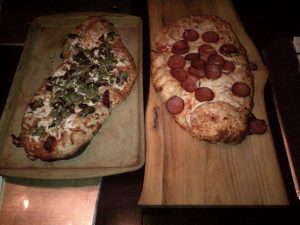 I’ve been thinking lately about an old Leonard Cohen poem that warns of the diminishing returns of perfectionism: Ring the bells that still can ring/Forget your perfect offering/There is a crack in everything/That’s how the light gets in.
I’ve been thinking lately about an old Leonard Cohen poem that warns of the diminishing returns of perfectionism: Ring the bells that still can ring/Forget your perfect offering/There is a crack in everything/That’s how the light gets in.
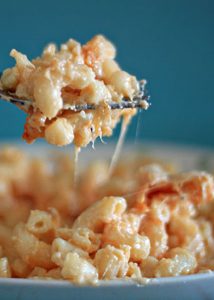 Fear not, gentle readers. I haven’t given up on family dinner, at least not yet. The journey continues. This week, however, my blogging energies were consumed by the start of before- and after-school activities, my husband’s eye surgery and a canine houseguest who used my entire house as a toilet. Not cool.
Fear not, gentle readers. I haven’t given up on family dinner, at least not yet. The journey continues. This week, however, my blogging energies were consumed by the start of before- and after-school activities, my husband’s eye surgery and a canine houseguest who used my entire house as a toilet. Not cool.